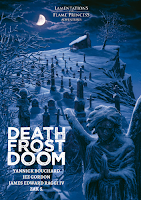14: Which RPG do you prefer for open-ended campaign play?
Answer: In many cases this answer could be "any of them." I suppose I would choose Basic Fantasy because of its generic quality. As a GM I can make the flavor whatever I choose. There isn't a lot of predetermined setting or flavor that I need to remove before making it my own. I've chosen another alternate questions today which I think compliments the standard one nicely.
Alternate Question: What gives an RPG its ‘replay value’?
Answer: Replay value suggests an open-ended campaign. It means being able to take the story wherever you want to go for as long as you want to go there. The last part of the previous statement is key. What makes you want to continually return to a game, again and again? I think there are a few important characteristics which provide this answer.
The first thing that makes a game easy to return to and play again, for me, is the lack of a predefined setting. I'm not talking about genre tropes. I'm talking about a detailed setting that is so well defined and staged that there's hardly any room for the PCs. This happens a lot in games that deal with some well-known IP, think Buffy, Marvel Super Heroes, MERP, or Star Wars. For me, theses types of games are immediately limiting because they are so bound to the story and world that has already been established. To me, it feels less like role-playing and more like playing dress-up. Don't get me wrong, these games can be really fun. I had a lot of fun playing MERP when I first bought it, but the campaign was always set amidst the larger Tolkien narrative making whatever we did feel like a second-rate spin-off.
Part of why I like Basic Fantasy so much and refer to its generic quality as a bonus is because I don't have to strip anything away like I would with Greyhawk, Faerun, or Mystara. BF gives me just what I need and nothing else. The rest is left up to me. As I understand it, Lamentations of the Flame Princess creator, James Edward Raggi IV, was initially a Basic Fantasy guy. LotFP grew out of his BF campaign and the way he played the game. I think his game is really great, but it lends itself to a historical 17th century setting, which again, is bound by the constraint of history. I guess what I'm trying to say is that replay value is directly proportional to how much room gives me as a GM.
Another thing that makes a game replayable for me is a limitless breadth and depth, or at least as limitless as my imagination. This is why I also tend towards fantasy. Science fiction can be fun, but it will always find it beholden to the laws of physics. Science fantasy allows for awesome, unscientific things like light sabers. Part of the reason I think D&D has been so successful for so long is because it is incredibly deep and all-encompassing. True, by this point, D&D has its own history and tropes that box it in, but the different versions throughout the years have shown how the game has remained flexible enough to change throughout the years. The OSR games I love right now are just a continuation of that.
A final reason to what gives an RPG replay value is how much I like the genre and the particular flavor (or lack thereof). This can trump the first two reasons. As confined as MERP was in its parameters, it had more replayability for me than another similar game might because I love LotR so much. In the end, we love what we love.
Subscribe to:
Post Comments (Atom)
GM Notes - Morgansfort Session 14 - Death Frost Doom - Part 2 of 2
So, here stands the final chronicle of my two-year Basic Fantasy campaign. It ended a year ago and I'm just now getting around to fini...

-
Jeff Easley's BECMI Thief I’ve recently decided to run an OD&D game. This, of course, brings with it the age-old question of whi...
-
It is around 11:30 p.m. Father Thelbain acts quickly and has his acolytes clean up the remains of the dead, mute cultist, Brother Malach...
-
So, here stands the final chronicle of my two-year Basic Fantasy campaign. It ended a year ago and I'm just now getting around to fini...




No comments:
Post a Comment